
Jethro Tull are a British rock band formed in Blackpool, Lancashire in 1967. Initially playing blues rock and jazz fusion, the band later developed their sound to incorporate elements of hard rock and folk to forge a progressive rock signature. The band is led by vocalist/flautist/guitarist Ian Anderson, and has featured a revolving door of lineups through the years including significant members such as longtime guitarist Martin Barre, keyboardists John Evans, Dee Palmer and Peter-John Vettese, drummers Clive Bunker, Barrie "Barriemore" Barlow and Doane Perry, and bassists Glenn Cornick, Jeffrey Hammond, John Glascock, and Dave Pegg.

Aqualung is the fourth studio album by the British rock band Jethro Tull, released on 19 March 1971, by Chrysalis Records. It is widely regarded as a concept album featuring a central theme of "the distinction between religion and God", though the band have said there was no intention to make a concept album, and that only a few songs have a unifying theme. According to one reviewer, the album has "dour musings on faith and religion" which for him have marked it as "one of the most cerebral albums ever to reach millions of rock listeners". Aqualung's success signalled a turning point in the career of the band, which went on to become a major radio and touring act.

Repeat – The Best of Jethro Tull – Vol II is a 1977 greatest hits album from Jethro Tull, featuring one track which, up to the time of this album's release, had not been issued. The album's first volume was M.U. – The Best of Jethro Tull.

A Passion Play is the sixth studio album by Jethro Tull, released in July 1973 in both UK and US. Like its predecessor, Thick as a Brick (1972), it is a concept album comprising individual songs arranged into a single continuous piece of music. The theme of the concept is apparently the spiritual journey of one man in the afterlife. In the original tour to support the album, three videos were used: one for the intro of the "play", a second for "The Story of the Hare Who Lost His Spectacles", and a final short segment to conclude the act. The whole of the concert was the high water mark of Jethro Tull's elaborate stage productions.

Ian Scott Anderson is a Scottish musician, singer and songwriter best known for his work as lead vocalist, flautist and acoustic guitarist of British rock band Jethro Tull. He is a multi-instrumentalist who, in addition to flute, plays keyboards, acoustic and bass guitar, bouzouki, balalaika, saxophone, harmonica, and a variety of whistles. His solo work began with the 1983 album Walk into Light; since then he has released another five works, including the sequel to the Jethro Tull album Thick as a Brick (1972) in 2012, entitled Thick as a Brick 2.

The Jethro Tull Christmas Album is the 21st studio album released by Jethro Tull, on 30 September 2003. As of 2021, it is the band's most recently released studio album.

Benefit is the third studio album by the British rock band Jethro Tull, released in April 1970. It was the first Tull album to include pianist and organist John Evan – though he was not yet considered a permanent member of the group – and the last to include bass guitarist Glenn Cornick who was fired from the band upon completion of touring for the album. It was recorded at Morgan Studios, the same studio where the band recorded its previous album Stand Up however the band experimented with more advanced recording techniques.
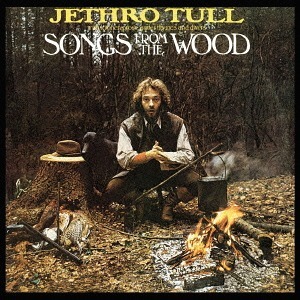
Songs from the Wood is the tenth studio album by British progressive rock band Jethro Tull, released February 1977. The album signalled a new direction for the band, who turned to celebrating British pagan folklore and the countryside life in a wide-ranging folk rock style which combined traditional instruments and melodies with hard rock drums and electric guitars.
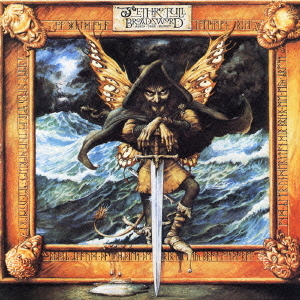
The Broadsword and the Beast is the 14th studio album by rock band Jethro Tull, released on 10 April 1982. The album is a cross between the dominant synthesizer sound of the 1980s and the folk-influenced style that Jethro Tull used in the previous decade. As such, the band's characteristic acoustic instrumentation is augmented by electronic soundscapes, provided by new keyboardist Peter-John Vettese. The electronic aspects of this album would be explored further by the band on their next release, Under Wraps.

Crest of a Knave is the sixteenth studio album by British rock band Jethro Tull, released in 1987. The album was recorded after a three-year hiatus caused by a throat infection of vocalist Ian Anderson, resulting in his changed singing style. Following the unsuccessful electronic rock album Under Wraps, ‘Crest of a Knave’ had the band returning to a more hard rock sound. The album was their most successful since the 1970s and the band enjoyed a resurgence on radio broadcasts, appearances in MTV specials and the airing of music videos. It was also a critical success, winning the 1989 Grammy Award for Best Hard Rock/Metal Performance Vocal or Instrumental in what was widely viewed as an upset over the favorite, Metallica's ...And Justice for All. The album was supported by "The Not Quite the World, More the Here and There Tour".
"Aqualung" is a song by the British progressive rock band Jethro Tull, and the title track from their Aqualung (1971) album. The song was written by the band's frontman, Ian Anderson, and his then-wife Jennie Franks.

Living with the Past is a live album by Jethro Tull. Disc one contains material from the Hammersmith Apollo performance on 20 November 2001 and features songs from different eras of Tull's history as well as two pieces from Ian Anderson's solo albums: "The Habanero Reel" from The Secret Language of Birds and the instrumental "In the Grip of Stronger Stuff" from Divinities: Twelve Dances with God. Disc two contains earlier recordings.
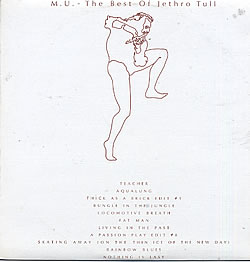
M.U. – The Best of Jethro Tull, released in 1976, is the first proper greatest hits album by Jethro Tull. It spans the years 1969 to 1975. The earlier Living in the Past (1972) compilation mainly dealt with non-album material, but this album only features one previously unreleased song, "Rainbow Blues".
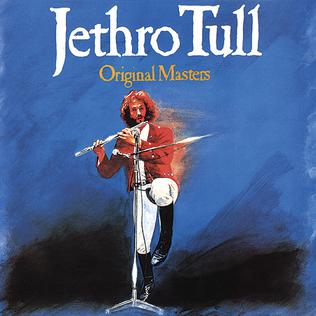
Original Masters is a greatest hits album by Jethro Tull released under Chrysalis Records in 1985. It was the band's third such effort, the first two being M.U. - The Best of Jethro Tull and Repeat - The Best of Jethro Tull - Vol II. Although the compilation was released in 1985, it does not include material released after 1977.

"Locomotive Breath" is a song by the British progressive rock band Jethro Tull from their 1971 album, Aqualung.

The Best Of Jethro Tull - The Anniversary Collection is a greatest hits album by Jethro Tull, released in 1993. It includes some of the band's biggest hits from 1968 to 1991.

The Essential (2003) is a greatest hits album by Jethro Tull, digitally remastered. The songs included and their order are the same as Tull's first greatest hits album, M.U. – The Best of Jethro Tull.

Living in the Past is a double album quasi-compilation collection by Jethro Tull, which contains album tracks, out-takes, the "Life Is a Long Song" EP, and all of their non-LP singles except for "Sunshine Day"/"Aeroplane" (1968), "One for John Gee", "17" and the original version of "Teacher" that appeared in the UK as the b-side of "The Witch's Promise" in 1969.
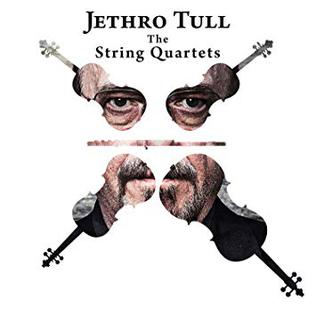
Jethro Tull – The String Quartets is a studio album featuring Ian Anderson, John O'Hara and the Carducci String Quartet, arranged by O'Hara. It was released on 24 March 2017.

"Skating Away on the Thin Ice of the New Day" is a song by British progressive rock band Jethro Tull. It was released on their album War Child in 1974. Written as a comment on global cooling for the band's aborted "Chateau D'isaster" album, the song was reworked in 1974 for War Child.



















